
Journal of Organization Design
Scope & Guideline
Empowering Scholars to Transform Organizational Landscapes
Introduction
Aims and Scopes
- Organizational Structure and Governance:
The journal investigates various forms of organizational structures, including traditional hierarchies, decentralized models, and innovative frameworks like holacracy and DAOs (Decentralized Autonomous Organizations). It explores how these structures impact governance practices and organizational performance. - Integration of Technology in Organizational Design:
A significant focus is placed on the intersection of technology and organization design, including the implications of AI, digital twins, and collaborative decision-making tools. The aim is to understand how technological advancements can reshape organizational frameworks. - Sustainability and Social Impact:
The journal addresses the integration of sustainability into organizational design, particularly in how organizations can align their structures and processes with societal goals and environmental considerations. - Self-management and Empowerment:
Research on self-managing organizations is a core area, analyzing how autonomy and decentralized decision-making can enhance organizational effectiveness and employee engagement. - Adaptation and Evolution in Organizations:
The journal emphasizes the evolutionary aspects of organizations, exploring how they adapt to changing environments and the role of organizational design in facilitating resilience and agility.
Trending and Emerging
- Decentralization and DAOs (Decentralized Autonomous Organizations):
There is an increasing focus on the characteristics, governance, and implications of DAOs as organizations transition towards more decentralized models. This trend highlights the relevance of blockchain technology in organizational design. - Digital Transformation and AI Integration:
Research on the integration of AI and digital technologies into organizational frameworks is on the rise, exploring how these tools can enhance decision-making, operational efficiency, and organizational adaptability. - Sustainability and Purpose-driven Design:
A significant trend is the emphasis on designing organizations that prioritize sustainability and social impact, reflecting a growing awareness of the need for businesses to align with broader societal goals. - Self-management and Employee Empowerment:
The exploration of self-managing organizations and the dynamics of employee empowerment is gaining traction, with studies examining how these models contribute to organizational effectiveness and innovation. - Complexity and Systems Thinking in Organization Design:
Emerging themes include the application of systems thinking and complexity theory to understand organizational dynamics, reflecting a shift towards recognizing organizations as complex adaptive systems.
Declining or Waning
- Traditional Hierarchical Structures:
Research centered on conventional hierarchical organizational models appears to be diminishing, as there is a growing preference for exploring flatter, more decentralized structures. This reflects a broader trend towards agility and self-management. - Static Organizational Models:
The journal has seen a decline in studies that propose static or inflexible organizational models, as contemporary research increasingly emphasizes adaptability and dynamic structures that can respond to rapid changes. - Focus on Conventional Management Practices:
There is a noticeable reduction in papers that emphasize traditional management practices and roles, as the discourse shifts towards exploring innovative management approaches, including the diminishing role of managers in certain contexts.
Similar Journals

Journal of Organisational Studies and Innovation
Empowering research that shapes modern enterprises.Journal of Organisational Studies and Innovation is a pivotal academic platform dedicated to advancing the fields of organizational studies and innovation management. Published by MANAGEMENT & BUSINESS ACAD, this journal aims to facilitate a deeper understanding of the complexities of organizational behavior and the dynamics of innovation within modern enterprises. With an ISSN of 2056-9122 and an E-ISSN of 2056-9130, it caters to a diverse audience of researchers, professionals, and academics by providing open access to high-quality peer-reviewed articles. The journal seeks to explore critical themes such as organizational change, leadership styles, and the implications of innovation on productivity, thereby contributing significantly to the discourse in management and business studies. In a rapidly evolving economic landscape, the Journal of Organisational Studies and Innovation plays a vital role in disseminating knowledge that informs best practices and fosters innovative solutions across various sectors.

Journal of Organizational and End User Computing
Innovating Insights into User-Centric Computing PracticesThe Journal of Organizational and End User Computing, published by IGI Global, is a leading peer-reviewed outlet dedicated to exploring the intersection of organizational practices and user interfaces within the digital realm. With a robust ISSN of 1546-2234 and an E-ISSN of 1546-5012, the journal has established itself as a crucial resource for scholars and practitioners in the fields of Computer Science Applications, Human-Computer Interaction, and Strategy and Management. Recognized for its quality, the journal attained Q3 status in Computer Science Applications and Human-Computer Interaction, and Q2 status in Strategy and Management in 2023, reflecting its esteemed position in academic rankings. Operating from the heart of the United States, the journal has converged its focus from 2004 to 2024, making it a reliable source for cutting-edge research and industry trends. Although it does not offer open access, the Journal of Organizational and End User Computing remains an invaluable repository of knowledge, perfect for researchers, professionals, and students seeking to advance their understanding of organizational structures and user engagement in computing environments.
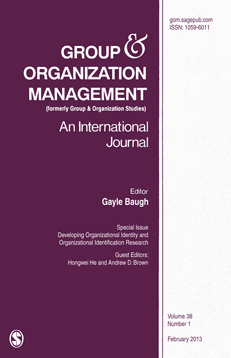
GROUP & ORGANIZATION MANAGEMENT
Advancing Insights in Organizational BehaviorGROUP & ORGANIZATION MANAGEMENT, published by SAGE Publications Inc., stands as a premier interdisciplinary journal focusing on the dynamics of groups and organizations within the fields of applied psychology, organizational behavior, and human resource management. With a distinguished Q1 ranking across multiple categories—specifically, Applied Psychology, Arts and Humanities, and Organizational Behavior and Human Resource Management—this journal is acclaimed for its rigorous peer-reviewed research and impactful contributions. The journal aims to promote scholarly dialogue and practical advancements that enhance understanding of group processes and organizational phenomena. With its long-standing history—from its inception in 1976 to the present—and a notable Scopus Rank that places it within the top tiers of its category, GROUP & ORGANIZATION MANAGEMENT is essential reading for researchers, practitioners, and students who are keen on exploring innovative theories and applications within this critical field.
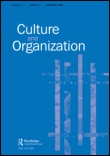
Culture and Organization
Innovating interdisciplinary dialogue on culture and organizations.Culture and Organization is a leading academic journal published by Routledge Journals, Taylor & Francis Ltd., based in the United Kingdom. This journal serves as a significant platform for the interdisciplinary exploration of cultural studies and organizational behavior, bridging theoretical insights and practical applications. With an impressive impact factor and categorized in Q1 for Cultural Studies and Q2 for Organizational Behavior and Human Resource Management, it addresses critical issues surrounding culture's influence on organizational practices and vice versa. The journal has established a robust reputation in the academic community, evidenced by its commendable rankings in Scopus, where it holds the 85th position out of 1304 in Cultural Studies. Culture and Organization is dedicated to advancing the understanding of organizational dynamics in various cultural contexts, making it an essential read for researchers, professionals, and students interested in the complexities of cultural interactions within the workplace.
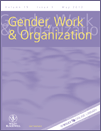
GENDER WORK AND ORGANIZATION
Unpacking Gender's Role in Modern Work EnvironmentsGENDER WORK AND ORGANIZATION, published by WILEY, is an esteemed journal dedicated to advancing the understanding of the intricate intersections between gender, work, and organizational dynamics. With a focus on interdisciplinary research, this journal serves as a critical platform for scholars and practitioners alike, exploring themes that encompass gender studies, organizational behavior, and human resource management. Established in 1994, it has continually provided high-impact insights, as evidenced by its recognition in the Q1 quartile for both Gender Studies and Organizational Behavior in 2023. The journal enjoys notable Scopus rankings, standing at #2 out of 213 in Gender Studies and #12 out of 230 in Organizational Behavior and Human Resource Management, reflecting its significant contribution to the field. Although it does not offer open access, the journal continues to be a vital resource for researchers and students seeking to engage with leading-edge scholarly work and practical applications that address contemporary challenges in the workforce related to gender issues. For further exploration of groundbreaking research, visit the journal at GENDER WORK AND ORGANIZATION.

Journal of Management & Organization
Driving excellence in business scholarship.Welcome to the Journal of Management & Organization, a premier academic journal published by Cambridge University Press that serves as a vital platform for the dissemination of high-quality research in the fields of Business, Management, and Organizational Behavior. With an ISSN of 1833-3672 and an E-ISSN of 1839-3527, this prestigious journal has been converging scholarly insights since 1995 and continues to influence thought leadership until 2024. Recognized for its rigor, the journal holds a commendable position in the 2023 category quartiles, ranking Q2 in both Business and International Management and Organizational Behavior and Human Resource Management. Its impressive Scopus rankings affirm its significance, with ranks of #50/230 and #103/443 respectively. The Journal of Management & Organization is dedicated to advancing understanding, fostering innovation, and promoting best practices among scholars, professionals, and students alike, providing an essential resource for those aspiring to drive impactful change in the organizational landscape.

Organization Technology and Management in Construction
Empowering the future of building through open access research.Organization Technology and Management in Construction is a prominent open-access journal dedicated to advancing knowledge in the fields of building and construction, civil and structural engineering, and the management of technology and innovation. Published by SCIENDO, this journal has established itself as a vital platform for researchers, professionals, and students since its inception in 2016, providing unrestricted access to cutting-edge research that drives the industry forward. With an impressive quartile ranking of Q2 in both Building and Construction and Civil and Structural Engineering, alongside respectable positions in various management categories, the journal serves as a critical resource for those seeking to explore innovative management approaches and technological advancements in construction. The journal's commitment to open access reflects a dedication to disseminating knowledge widely, ensuring that all stakeholders in the field can benefit from the latest developments. Operating out of Warsaw, Poland, the journal aims to foster collaboration and discourse among a diverse community of scholars and practitioners, playing an essential role in shaping the future of construction management.
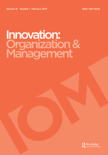
Innovation-Organization & Management
Exploring the Frontiers of Management and InnovationInnovation-Organization & Management is a premier journal in the realm of Management of Technology and Innovation, published by Routledge Journals, Taylor & Francis Ltd. With its ISSN 1447-9338 and E-ISSN 2204-0226, this esteemed publication serves as a vital platform for researchers, industry professionals, and scholars interested in the dynamic intersections of innovation, organization theory, and management practices. Since its inception in 2008, the journal has established a robust reputation, earning a Q1 ranking in the 2023 category of Management of Technology and Innovation and ranking #62 out of 289 in Scopus. As a key contributor to academic discourse, the journal aims to foster an understanding of how organizations can effectively harness innovation to achieve strategic effectiveness and competitive advantage. Although it is not an open-access journal, it is committed to providing high-quality peer-reviewed research articles that address contemporary challenges and advancements in the field. Located in the United Kingdom, Innovation-Organization & Management continues to be an essential resource for cultivating knowledge and influencing practice in the field of innovation management.

German Journal of Human Resource Management-Zeitschrift fur Personalforschung
Unleashing Insights for Tomorrow's WorkforceThe German Journal of Human Resource Management - Zeitschrift für Personalforschung, published by SAGE Publications Inc, stands as a premier platform dedicated to advancing the field of human resource management. With an impressive impact factor and consistently ranked in the Q1 category for Organizational Behavior and Human Resource Management, this journal serves as a vital resource for researchers, practitioners, and students interested in the intricacies of workforce dynamics and organizational effectiveness. Its Scopus ranking at #33 out of 230 in its category, placing it in the 85th percentile, underscores its significance and the high caliber of research it disseminates. The journal offers open-access options, enhancing visibility and accessibility for a global audience. By fostering an interdisciplinary approach, the journal aims to bridge theory and practice, encouraging innovative discussions and discoveries within the human resource domain. Join a community committed to shaping the future of human resource practices and policies.
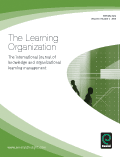
Learning Organization
Empowering Growth Through Scholarly InsightsLearning Organization is a leading academic journal published by Emerald Group Publishing Ltd, specializing in the fields of education, organizational behavior, and human resource management. With an ISSN of 0969-6474 and an E-ISSN of 1758-7905, this esteemed journal has been at the forefront of scholarly discourse since its inception in 1994 and is set to continue until 2024. Currently holding a Q2 rating in both Education and Organizational Behavior categories as of 2023, it ranks impressively within the top percentiles of 81st and 66th in respective fields based on Scopus metrics. The journal serves as a vital resource for researchers, professionals, and students alike, aiming to enhance understanding and application of learning within organizations. While it is not an Open Access publication, its extensive analysis of contemporary issues makes it an essential read for those engaged with the evolution of learning systems in dynamic work environments. As it continues to publish innovative research and insights, Learning Organization remains an influential platform for advancing the study and practice of organizational learning.